What is a Health Walk? Discover our walking groups for people with arthritis
18 December 2023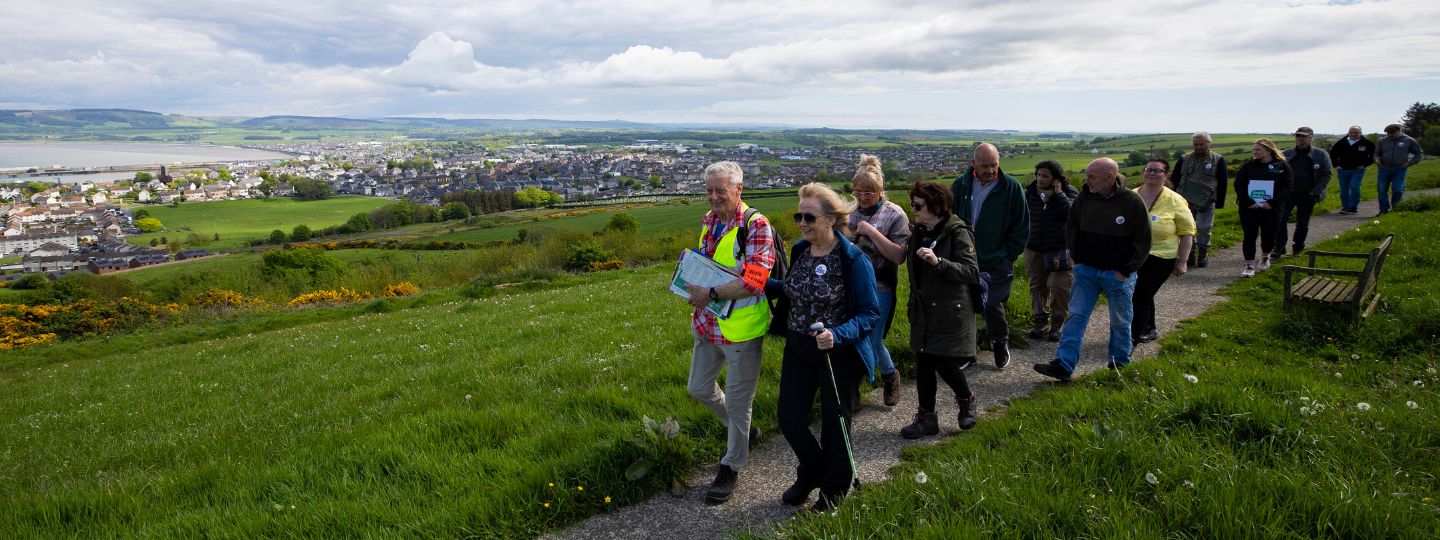
Walking is often recommended if you have arthritis because it’s gentle, low-impact and won’t put too much strain on your joints.
We know it can be dauting to take that first step though – and we want to help. That’s why we organise Health Walks across Scotland, in partnership with the walking charity, Paths for All.
Led by an experienced guide, these are friendly, free walks, specially designed for people living with arthritis and other musculoskeletal (MSK) conditions.
Gary Small, Regional Officer Scotland at Versus Arthritis , and Peter Ross, Health Walk Leader, both enjoy spending time in nature and want to support people with arthritis stay active.
Here they explain more about Health Walks and the benefits of keeping moving if you have arthritis.
What are Health Walks?
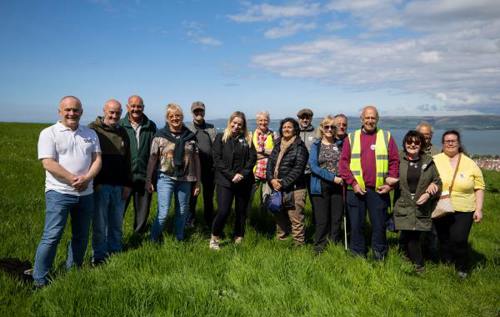 Health Walks are gentle walks that:
Health Walks are gentle walks that:
- you take part in a friendly, welcoming group
- are guided by a trained Walk Leader
- are along a safe risk-assessed route
- promote positive physical and mental wellbeing
- are accessible and inclusive to everyone.
“Our Health Walks are really about getting people moving, particularly people with arthritis and musculoskeletal conditions,” explains Gary.
“It’s a nice gentle walk in the countryside, which happens on a regular basis with a standard meeting point,” adds Peter.
“We try not to do the same walk twice in a row. I'll always try and find a place of interest for the walk – whether that’s a flower, a well or some geese. Where we go really depends on the people who show up on the day.”
At the end of the walk, the group often grab a cup of tea or coffee together, so it’s a great way to meet like-minded people too.
What is a Health Walk?
Walking benefits for people with arthritis
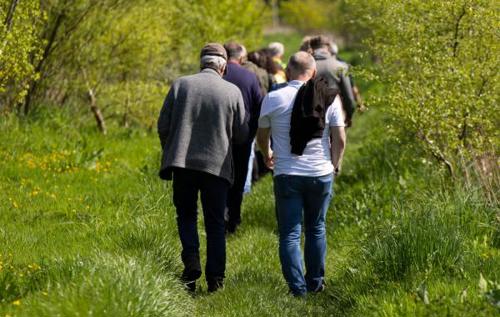 Some people with arthritis may worry that exercise may further damage their joints, but the truth is exercise is good for us.
Some people with arthritis may worry that exercise may further damage their joints, but the truth is exercise is good for us.
Our bodies are designed to move, and resting too much could actually harm our joints and tissues.
If you haven't been active in a while, walking can be a great place to start. This is because:
- You can choose the distance and pace that’s suits you.
- It’s a free activity that you can do anywhere.
- You don’t need much equipment (just comfortable shoes and a waterproof jacket, in case the weather changes).
- It’s easy to make it part of your daily routine and make it a habit.
- Being in nature can boost your mental wellbeing.
“It’s absolutely vital that people with arthritis keep moving, It helps keep your joints strong, reduces stiffness, and it’s also a great social activity.”
Who takes part in our Health Walks?
Anyone living with a musculoskeletal condition can take part in our Health Walks.
“No matter who you are, where you are, or your ability, you’ll enjoy yourself and meet a welcoming group,” says Peter. “We also have people in our walks who live with multiple conditions.”
What kind of walks can you expect?
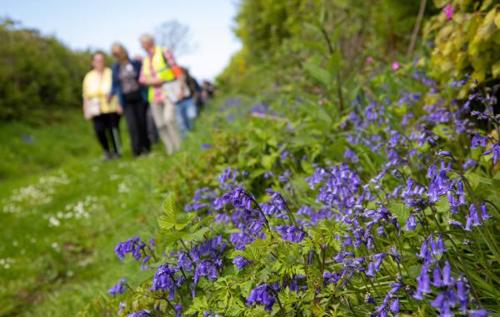 Our Walk Leaders often have several routes up their sleeve, so you're sure to find new, breathtaking views.
Our Walk Leaders often have several routes up their sleeve, so you're sure to find new, breathtaking views.
One of Peter’s favourite walks is along the beach in Stranraer. “We’ve got plenty of beaches to walk on,” he says. “It’s great because it’s a firm walk, it's invigorating to get some sea air, and it also means everyone can walk at their own pace.”
Pop by another day of the week, and he might take you for a peaceful walk along woodlands brimming with snowdrops and flowers.
“I've got wheelchair accessible walks with tarred or concrete surfaces too,” he adds. “So, there are choices available for everyone.”
What are the mental health benefits of walking?
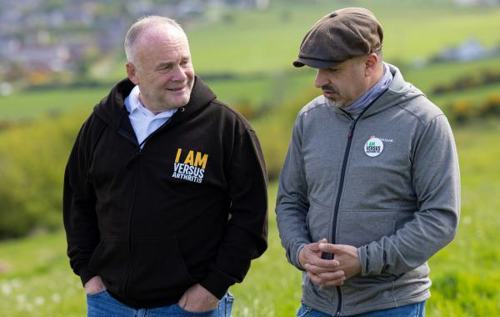 Not only is walking brilliant for your physical health, it’s also mindful and relaxing too.
Not only is walking brilliant for your physical health, it’s also mindful and relaxing too.
“When I’m walking, I just feel my stomach unclench,” Peter says. “It changes your mindset and helps you concentrate on what you’re doing rather than worrying about the things you don’t have control over.”
On top of this, Gary also points out that on the Health Walks, you’re likely to meet a friendly bunch of people, so it’s great for those who might feel isolated.
“We're here to tackle loneliness and social isolation too,” he explains. “We know that people with osteoarthritis can particularly be at risk of isolation because of their condition. So, a big part of our Health Walks is the friendships that people create, and the chats they have.
“People become good friends. They're able to interact and chat with the other walkers about their medication or pain and they see that they're not alone. So, it’s got a positive impact on people's mental health, as well as their physical health.
“When people first turn up, sometimes they don't tell you how I'll they are. But after a few walks they start to open up.”
What if I’m not very active?
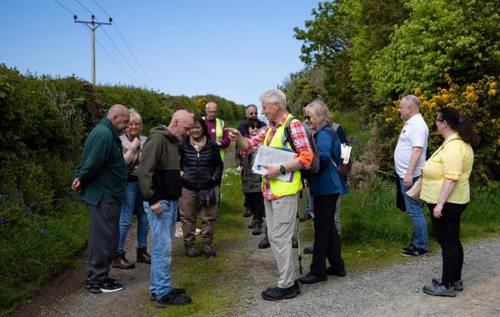 Even if you find walking short distances tough, don’t worry. We can adapt the walk to suit you.
Even if you find walking short distances tough, don’t worry. We can adapt the walk to suit you.
“When people have been really struggling to walk, I’ll take them on a short walk from one end of a car park to the café, which has a sea view,” Peter explains.
“It’s a short, flat walk. And over time, they can build up and walk farther. It could be the start of something progressive.”
No matter what your ability, there’s absolutely no pressure. The Walk Leaders will walk at your pace, and make sure no one is left behind.
“We’re keen to make sure that people with arthritis can pace themselves” says Gary.
“Often our walkers will spread out and the Walk leaders will walk alongside separate groups. Because we know some people can walk a bit faster and some might be beginners. We always make sure that everyone can take part.”
Who are Paths for All?
To bring these walks to life, we’ve teamed up with the walking charity, Paths for All.
They provide our volunteers with insurance, advice, and training on how to risk assess a walk, so you can rest assured knowing our walks are safe.
What advice would you give to someone with arthritis who wants to get active?
“I would just encourage people to take that first step,” says Gary. “Yes, it can be difficult, but you’ll find good company and most importantly you’ll find that your condition will improve.
“It's a big step towards self-managing your own condition. Plus, you'll be doing it with people with similar conditions. You won't be doing this on your own.”
We’re here for you
- If you need advice or support, remember you can:
- Call our free helpline on 0800 5200 520
- Chat to our Arthritis Virtual Assistant
- Join our online community
- Stay in touch and follow us on X (Twitter), Facebook and Instagram.